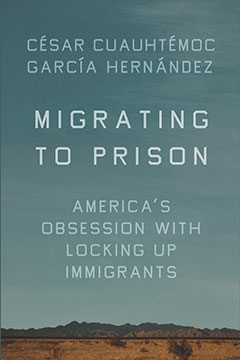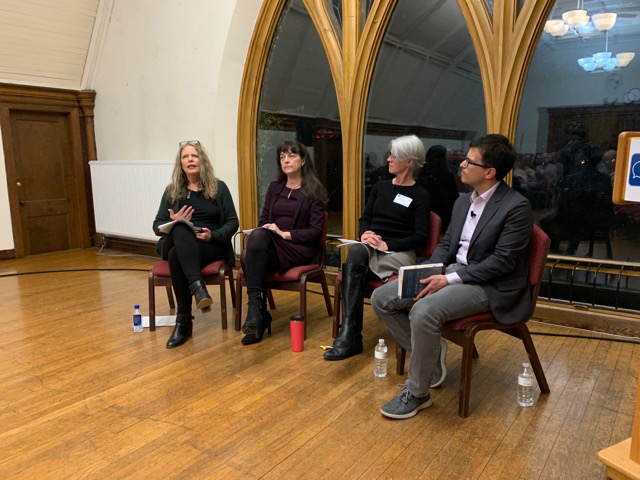
For much of America’s history, we simply did not lock people up for migrating here. Yet over the last thirty years, the federal and state governments have increasingly tapped their powers to incarcerate people accused of violating immigration laws. As a result, roughly 400,000 people a year now spend some time locked up pending civil or criminal immigration proceedings.
César Cuauhtémoc García Hernández‘s new book takes a hard look at the immigration prison system’s origins, how it currently operates, and why. It tackles the outsized presence of private prisons and how those on the political right continue, disingenuously, to link immigration imprisonment with national security risks and threats to the rule of law.
César Cuauhtémoc García Hernández is a professor of law at the University of Denver and an immigration lawyer. He runs the blog Crimmigration.com.
Recorded for broadcast 2.19.2020


Support our mission to provide free and open discussions about the pertinent issues and ideas confronting us, in the world today.
Join the conversation. Become a member of the Friends of Cambridge Forum to support our ongoing public events and radio series. Contribute $100 or more and receive our newsletter and invitations to special Cambridge Forum events.
To join, call the Forum office at 617 495-2727 or make a contribution now online via Paypal.
2 thoughts on “Migrating to Prison”
Comments are closed.


We enjoyed a fabulous turnout for Cambridge Forum’s MIGRATING TO PRISON event. In addition to the author, Cesar Garcia Hernandez giving a very comprehensive summary of the current immigration prison system and the reasons why he wrote his book, we had a lively a very informative panel discussion.
We looked at the various implications of our current immigration policies and how these measures impact the general psyche of the nation and ” corrode the social fabric of our humanity” according to Denise Bell, researcher on immigrant rights from Amnesty International USA.
When asked what we could do to affect current immigration practices, Hernandez suggested we divest from the private prison system and follow the money.
“I suggest that people with a Harvard affiliation join up with the Harvard Prison Divestment Campaign. They filed a lawsuit this week with the goal of pushing Harvard to pull investments out of the prison industry.” Furthermore, Bell suggested signing campaigns via their site and supporting the work of AI.
Leslie Ditrani, business immigration attorney and managing partner for Chin and Curtis LLP emphasized the importance of each individual doing what he or she can – she herself has visited these border camps volunteer to witness conditions for herself. She also suggested spreading the word and today, she posted good some news regarding a decision that the American Immigration Council has just won. ( see below)
American Immigration Council
Dear Board Members:
Wonderful news this afternoon – we won a permanent injunction in our Doe v. Wolf case where we’ve been fighting since 2015 for improved conditions in CBP custody. Today’s win from a federal court judge states that CBP cannot hold detainees, whose processing is complete, longer than 48 hours from book-in time, “unless and until CBP can provide conditions of confinement that meet detainees’ basic human needs for sleeping in a bed with a blanket, a shower, food that meets acceptable dietary standards, potable water, and medical assessment performed by a medical professional.”
This decision applies to the Tucson (Arizona) sector but we hope it sets a precedent for how people will be treated in CBP custody nationwide.
From Greta Bro, art therapist and musician, VOCES:
First, I want to acknowledge that it is great news Leslie that you won a permanent injunction to improve conditions of CBP custody. I also support Cesar’s campaign to urge Harvard to divest from corporate investment in prisons. This is an important step which could ripple out through academic communities.
I want to respond to your request for a list of what to do to help refugees and immigrants who are being criminally targeted because of racist, nationalistic and xenophobic propaganda.
1. Support non-profits like RAICES, the International Rescue Committee, Amnesty International, Voces Arts and Healing and others.
2.Volunteer your skills to these non-profits
3.Vote against government corruption locally and federally.
4. Show solidarity with immigrants in your community. Reach out to them. Listen and support initiatives to become a sanctuary city.
5. Promote initiatives that combat rape, child abuse, domestic abuse erallyand sex trafficking in Central America, Mexico and the Unites States . Support organizations like International Women’s Health Coalition who promote healthy choices for women.
6. Boycott institutions and corporations who support and invest in prison systems that exploit people legitimately seeking asylum.
7. Boycott corporations that support the current presidential administration.
8. Read books like Migrating to Prison